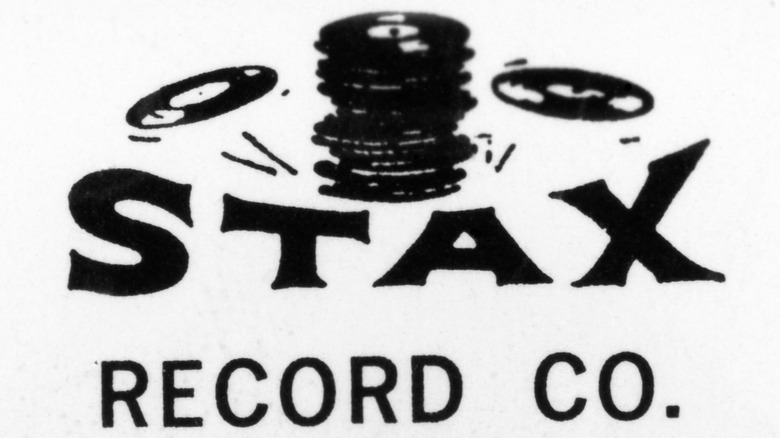Why Isaac Hayes Filed For Bankruptcy
Who is the iconic singer from the 1970s with songs so smooth that they influenced the entire genre of soul music? Hayes. Who helped popularize the Blaxploitation film genre, opening the door for Black directors and actors with one of the most iconic soundtracks in the history of cinema? Hayes. Who wrote the main theme for "Shaft" that is currently being parodied right now? Isaac Hayes.
While Isaac Hayes has become more synonymous with the 1970s, his career in the music industry began in the previous decade. During the 1960s, Hayes was one of the driving forces behind the scene at Memphis' famed Stax Records, the Motown of the south (via Polyphonic, on YouTube). As a session musician and songwriter, Hayes wrote and played on two of the studio's biggest hits, "Hold On, I'm Coming" and "Soul Man," both recorded by duo Sam and Dave. He also filled in as the pianist for Booker T. Jones in his band, Booker T. and the MGs (per The New Yorker).
Hayes was certainly a talented musician in his own right, but he was far from a singular star. Stax Records co-founder, Jim Stewart, said that Hayes' singing was "too pretty" for the period. Looking back on his career, Hayes agreed with Stewart's opinion, saying that the era was dominated by James Brown's style of rougher singing, leaving Hayes without a lane in which to drive. After a failed debut album, "Presenting Isaac Hayes," a series of tragic circumstances led to Hayes' big break into superstardom.
Otis Redding's death set the stage for Isaac Hayes' solo career
While Isaac Hayes was an important musician at Stax, Otis Redding (above) was the clear star of the recording studio. Redding had spent the 1960s holding Stax Records on his shoulders while belting out classic songs and leaving audiences in a frenzy with his energetic live shows. In June 1967, Redding performed at the Monterey Pop Festival, which expanded his popularity to a mainstream audience. Unfortunately, neither Redding nor Stax had long to capitalize on the performance. On December 10, 1967, Redding and most of his backing band died in a plane crash (via Britannica).
Making matters worse, a deal with Atlantic Records led the studio to lose most of their back catalog to Atlantic, as well as their other star act, Sam and Dave (per Polyphonic, on YouTube). In desperation, Stax executive Al Bell ordered the remaining artists to record new music to rebuild the lost catalog. The plan, known as "The Soul Explosion," produced 28 albums in a short period, including Hayes' second studio album, "Hot Buttered Soul." Hayes was given full creative control and went into the studio. During this same time, Hayes had begun to participate more in the Civil Rights Movement. He had planned to meet Martin Luther King in Memphis on April 4, 1968, but never got the chance. King was assassinated at the Lorraine Motel that day. Hayes said he took the anger he felt and put it into his music, leading to his breakthrough work.
Hayes and Stax Records were both in debt
Despite the success of Hayes and the high volume of music now coming out of Stax, the record company was still deep in debt. On the outside, it looked as if Hayes and Stax were going in opposite directions. While Stax continued to barely float above water, Hayes released acclaimed albums such as "Black Moses" and the soundtrack for Blackplotation film "Shaft" (via The Guardian). The latter album netted the singer two Grammy Awards and the Academy Award for best original song.
On the other hand, Stax's "Soul Explosion" plan had worked like they wanted for a short time, with the studios finding more financial stability with several star artists, such as the Staple Singers and Rufus Thomas (via Stax Museum). In August 1972, "Wattstax," a musical festival starring singers from Stax, expanded the label to the west coast. The subsequent live album sold half a million copies in only a week. However, the good fortunes ran out later that year. In November, the IRS began to look closely into Stax's financial standing after arresting a security agent of the label who had $130,000 in a briefcase. Their distribution deal with CBS collapsed soon after, putting them on the fast track back down to financial ruin.
The collapsed deal meant the label could not distribute their artist's albums, leaving Hayes without the ability to profit from record sales. The tense situation soon became untenable for the artist and label.
Isaac Hayes sues Stax and forms his own label
By the mid-1970s, Stax Records was a slowly dying company, without a distribution deal with a bigger label. This left them unable to market and sell their musicians' work to the public. For Isaac Hayes, who was at the apex of his music career, the situation became too much to handle. The singer was in debt to the Union Planters Bank, which administered the loans to Stax Records (via the Wall Street Journal). To obtain either the money or independence he desired, Hayes sued Stax to the tune of $5.3 million in 1974 (per "Soulsville, USA: The Story of Stax Records"). Unable to pay Hayes his royalties and with the threat of foreclosure by the Union Planters Bank, Stax was forced to release their star singer from his contract.
The loss of Hayes was the final nail in the coffin for the Motown of the south. Soon, comedian Richard Pryor would leave the company over unpaid royalties and other artists would follow. The next year for Stax Records would be a slow funeral dirge. On December 19, 1975, Stax finally went bankrupt, and federal marshals, at the request of the bank, seized the building and the master tapes of the famed company (per Stax Museum).
Now removed from Stax, Hayes had to clear up his debt. He formed his own studio, which he also named "Hot Buttered Soul," and his 1975 album, "Chocolate Chip," hit the Top 20 and went gold (via Ultimate Classic Rock).
Isaac Hayes bought a failing professional basketball team
So what does one do if they are not in the best financial situation? Maybe buy a professional basketball in a failing league?
After the 1973-74 season, the Memphis Tams of the American Basketball Association finished the season with the league's worst record, and owner Charles Finley no longer had an interest in the team (per Remember the ABA). Hayes, along with his fellow Stax Records musician Al Wilson, was part of the new ownership group that bought the Memphis Tams, which they renamed the Sound for the 1974-75 season. The ownership group also included Mike Storen, who was the commissioner of the ABA before resigning from the position to join the team.
Storen hoped that Memphis would become a viable basketball city and would be included in the ABA-NBA merger that was soon to come. Despite the early excitement the team generated, the team struggled early in the season because of a number of injuries to key players and would be knocked out early in the playoffs. After the season, ABA Commissioner Tedd Munchak gave the team a strict deadline of June 1, 1975, to accomplish three things: sell 4,000 season tickets, find new investors, and secure a more favorable lease at the Mid-South Coliseum. The Sounds failed at all three and the league took over the franchise and sold it to Baltimore. Memphis would not see another pro basketball team until 2001.
Low album sales led to him filing for bankruptcy
By 1976, Isaac Hayes was in a similar financial state as Stax, counting down the days until he hit bankruptcy. In his personal life, his third wife, Mignon Harley, filed for divorce, though she would change her mind and remain married to the singer for another decade. His second wife, Emily Ruth Watson, was still receiving child support payments and alimony (per Amomama).
In debt to Union Planters Bank to the tune of around $6 million, Hayes' output grew (via CNBC). Between 1973-1976, Hayes would record two albums each year (via All Music). However, the albums failed to generate the same sales as "Hot Buttered Soul" or his soundtrack for "Shaft" (per The Guardian). The dam finally burst for Hayes when he was forced to file for bankruptcy in 1976. The soul singer lost his home, most of his private property, and the rights to all future royalties earned from the music he had written, produced and/or performed to that point.
Hayes would continue to be a mainstay on the R&B charts and keep up his high level of productivity, recording albums in 1977, 1978 and 1980. He also expanded his creativity to acting in movies and television shows. Perhaps his most famous performance came as the voice for the popular character of Chef in the adult cartoon "South Park." He also acted in films and opened a chain of restaurants. In 2002, Hayes was elected into the Rock and Roll Hall of Fame (per Wall Street Journal). He died, age 65, in 2008.





